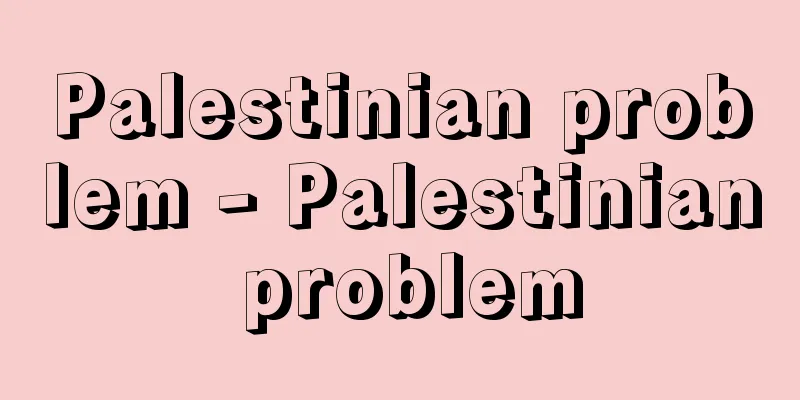Palestinian problem - Palestinian problem

|
A conflict between Arab powers and Israel over Palestine. As a result of the rise of the Zionist movement from the beginning of the 19th century, the influx of Jews into Palestine became more frequent. During World War I, Britain adopted contradictory policies, promising the Arabs the establishment of a state in Palestine in the Hussein-McMahon Letter and the Jews the Balfour Declaration, which intensified the conflict between the two nations after the war. After World War II, Palestine was divided and the Jews established the State of Israel. This led to four Middle East wars and armed conflicts in 1948, 1956, 1967, and 1973. During these wars, many Palestinian and Arab refugees flowed into neighboring countries. As a result of the Third Middle East War, Nasser's leadership declined, and the Palestinian organization PLO (Palestine Liberation Organization) became the main force in the liberation movement, replacing the Arab countries. After the Fourth Arab-Israeli War, the world came to recognize that there would be no lasting peace in the Middle East unless Palestinians were allowed to exercise their national rights, including the establishment of a state, and the PLO's international standing rose. In this context, the PLO, which had been hit hard by the peace agreement between Egypt and Israel (Camp David Accords) and the withdrawal from Beirut during the Lebanon War, changed course from armed struggle to a realistic diplomatic strategy. The Gaza Strip and the West Bank, which had been under Israeli occupation since 1967, became the focus of attention. In 1988, the PLO and Israel achieved historic mutual recognition. Furthermore, the Gulf War made the division of Arab countries decisive, and under the US-led Middle East peace process, the PLO and Israel signed the Declaration of Interim Self-Government for Palestine in 1993, and a Palestinian Interim Self-Government Government was established in both Gaza and Jericho (Oslo Accords). However, after the Likud Party's Sharon administration came to power in Israel in 2001, peace negotiations under the Oslo Accords reached a deadlock. After the September 11 attacks in the United States, the Sharon administration adopted a more hardline policy, and in 2002 it invaded Palestinian territories, which was followed by a flurry of suicide bombings. After the Iraq War in 2003, the Bush administration in the United States presented a "roadmap" for Palestinian national independence and coexistence with Israel, but the cycle of violence soon flared up again and the situation worsened. After the death of PLO Chairman Arafat in 2004, moderate M. Abbas took over as his successor, and momentum for peace talks increased. In August 2005, the withdrawal of Israeli settlers from the Gaza Strip and parts of the northern part of the West Bank was completed. However, Hamas won the general election in 2006, and a coalition government between Hamas and the moderate Fatah was formed in 2007, but internal conflicts continued, leading to a civil war and the collapse of the coalition government. Israel and the United States did not recognize Hamas as a negotiating partner, and in December 2008 Israel bombed Hamas in the Gaza Strip, and in January 2009 launched a ground invasion. In the Israeli general election in February 2009, Netanyahu's Likud party made great strides, though it failed to become the largest party, and formed a right-wing coalition with the Labor Party and others, returning Netanyahu to the post of prime minister for the first time in 10 years. Netanyahu accelerated his policy of continuing settlement projects, widening the gap with the Palestinian government, which made a settlement freeze a condition for resuming peace talks. Palestine applied for UN membership for the first time in September 2011, and in November 2012 the UN General Assembly approved by a majority a resolution to upgrade the status of the Palestinian Authority from observer organization to observer state. An increasing number of countries are recognizing Palestine as a state. However, in the January 2013 Israeli general election, Likud ran on a unified list with Israel-Paytin, also a right-wing, far-right party, as Likud-Paytin, and although it lost a large number of seats, it still managed to become the largest party, and in March a right-wing, center-right coalition government was formed, with Netanyahu becoming prime minister for the third time. In July 2014, Israel launched a fierce attack on Hamas strongholds in the Gaza Strip, and although a ceasefire agreement was reached at the end of August, 2,000 Palestinian residents were killed. In the March 2015 general election, Likud was overtaken by the Zionist Union, but still managed to become the largest party, and Netanyahu is expected to continue leading the coalition government. Related topics: Abbas | Israel | Intifada | Jerusalem | Sykes-Picot Agreement | Holy Land issue | World War I | Middle East | Palestinian Authority | Bunch | Jews | Jordan Source : Heibonsha Encyclopedia About MyPedia Information |
|
パレスティナをめぐるアラブ勢力とイスラエルの間の紛争。19世紀初めからシオニズム運動の高まりの結果,ユダヤ人のパレスティナ流入が盛んになった。第1次大戦中,英国が,フサイン=マクマホン書簡でアラブ人に,バルフォア宣言でユダヤ人に,それぞれパレスティナにおける建国を約束するという矛盾した政策をとったため,戦後両民族の対立が激化した。第2次大戦後パレスティナは分割され,ユダヤ人はイスラエル共和国を建国。これを機に1948年,1956年,1967年,1973年の4次の中東戦争と武力抗争が続いた。これらの戦争の過程で多くのパレスティナ・アラブ難民が周辺諸国に流入した。第3次中東戦争の結果,ナーセルの指導力は後退し,アラブ諸国にかわってパレスティナ人自身による組織PLO(パレスティナ解放機構)が解放運動の主体となった。また第4次中東戦争以後,パレスティナ人の国家樹立を含む民族的権利の行使を認めない限り,中東に永続的な平和がもたらされないという認識が世界中に深まり,PLOの国際的地位が高まった。こうしたなか,エジプトとイスラエルとの和平(キャンプ・デービッド合意),レバノン戦争によるベイルート撤退で打撃を受けたPLOは,武装闘争から現実的な外交戦略に路線を変更。1967年以来イスラエル占領下におかれたガザ地区とヨルダン川西岸地区が問題の焦点となった。1988年にはPLO・イスラエル間に歴史的な相互承認が成った。さらに湾岸戦争でアラブ諸国の分裂は決定的となり,アメリカ主導の中東和平プロセスのもと,1993年PLOとイスラエルはパレスティナ暫定自治宣言に調印,ガザ,イェリコの両地区にパレスティナ暫定自治政府が樹立されることになった(オスロ合意)。しかし,イスラエルで2001年リクード党のシャロン政権が登場して以後,オスロ合意による和平交渉は行き詰まった。米国における9.11事件以後シャロン政権は一層強硬策に転じ,2002年にはパレスティナ自治区に軍事侵攻し,これに対する自爆テロも激発した。アメリカのブッシュ政権は2003年のイラク戦争後,パレスティナ国家の独立とイスラエルとの共存をめざす〈ロードマップ(行程表)〉を提示したが,まもなく暴力の連鎖が再燃し,情勢はむしろ悪化した。2004年PLOのアラファート議長の死後,穏健派のM.アッバスが後任となり,和平交渉の気運が高まった。2005年8月,ガザ地区と西岸地区の北部の一部からのイスラエル人入植者の退去が完了した。しかし2006年ハマースが総選挙で勝利し,2007年にハマースと穏健派のファタハの連立政権がいったん成立したが,内部抗争が続き,さらに内戦状態となり,連立政権は崩壊した。イスラエルと米国はハマースを交渉相手と認めず,2008年12月イスラエルはガザ地区のハマースを空爆,さらに2009年1月には地上侵攻した。2009年2月のイスラエル総選挙で,ネタニヤフ率いるリクードが第1党は逃したものの躍進し,労働党などとの右派連立を実現,ネタニヤフが10年ぶりに首相に返り咲いた。ネタニヤフは,入植事業の継続政策を加速,入植凍結を和平交渉再開の条件とするパレスティナ政府との溝はさらに拡がった。パレスティナは2011年9月,はじめて国連に加盟申請を行い,2012年11月,国連総会は,パレスティナ自治政府の参加資格を,オブザーバー組織からオブザーバー国家に格上げする決議案を賛成多数で承認した。パレスティナを国家として承認する国も増えている。しかし,2013年1月のイスラエル総選挙でリクードは,同じく右派・極右のイスラエル・ペイティヌとともにリクード・ペイティヌとして統一名簿で臨み,大幅に議席は減らしたものの第1党を確保,3月右派・中道連立内閣を発足させ,ネタニヤフが3度目の首相となった。2014年7月イスラエルはガザ地区のハマース拠点に猛攻撃を加え,8月末停戦合意が成立したが,パレスティナ住民2000人が犠牲となった。2015年3月の総選挙ではリクードはシオニスト・ユニオンに追い上げられたものの第1党を確保,ネタニヤフが連立政権を引き続き率いるとされている。 →関連項目アッバス|イスラエル|インティファーダ|エルサレム|サイクス=ピコ協定|聖地問題|第1次世界大戦|中東|パレスティナ自治政府|バンチ|ユダヤ人|ヨルダン 出典 株式会社平凡社百科事典マイペディアについて 情報 |
<<: Parästhesie (English spelling) [Germany]
>>: Palestine Partition Resolution - Palestine Partition Resolution
Recommend
Art supplies - Gazai
〘noun〙① In painting, the materials used to paint a...
Ikubigoke - Ikubigoke
A small moss of the family Cladocephala. It is dis...
Morveau, LBGde (English spelling) MorveauLBGde
...Therefore, it is natural that chemists should ...
Epipalaeolithic
…That is, it is seen as a transitional period fro...
menetrier (English spelling)
... From the end of the 11th century in southern ...
Battle of Ishizu
During the Nanboku-cho period, the Ashikaga factio...
Koichi Furuichi - Koichi Furuichi
Born: 1854 (Kaei 7), 12th day of leap year 7, Edo ...
Japan Labor-Farmer Party - Nihonro no Uto
A moderate proletarian party in the early Showa p...
《Gokyorei》 - Gyokyorei
...A series of classical shakuhachi songs. There ...
Maritime Charter - Kaijo Kensho
…Also translated as the Navigation Acts. The most...
Ivanoe Bonomi
Italian politician, conservative reformist. A law...
Reiwa Shuuge - Ryo no Shuuge
This is a compilation of commentaries on the Yoro...
Philoxenos
…In ancient Egypt, the murals of the 19th Dynasty...
Ozokerite - The Horror
→ Earth Source: Asakura Publishing Dictionary of P...
Ashira [bow] - ashirai
A term in Japanese music. It is used in a variety ...









